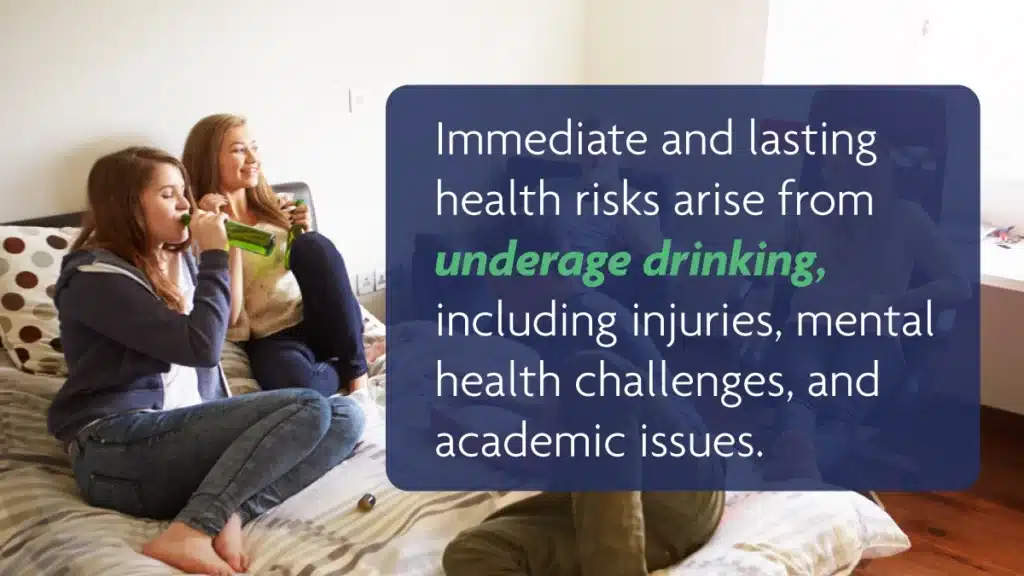In the United States, the epidemic of alcoholism among teens can result in alcohol-related problems such as accidents and alcohol poisoning. Educating young people about the risks associated with alcohol is crucial, empowering them to make responsible choices as they navigate through adolescence and beyond.
Key Takeaways
Underage drinking brings risks, harming health, safety, relationships, academics, and future opportunities for young lives. Here’s what you need to know:
- Laws for underage drinking include federal rules and state-level consequences, necessitating understanding.
- Immediate and lasting health risks arise from underage drinking, including injuries, mental health challenges, and academic issues.
- Dangers extend beyond individuals, impacting victims of drunk driving and raising liability concerns for damages.
- Seeking help is crucial for mental well-being, with changes in sleep, appetite, energy, or behavior indicators.
If your teen has a drinking problem, contact our teen treatment center at (845) 479-6888 for more information.
Underage Drinking and the Law
Engaging in underage drinking can have serious legal repercussions. Understanding the laws and regulations surrounding alcohol use is crucial for both young people and adults. Let’s delve into the specifics, starting with the federal rules that set the stage for state-level consequences.
The Federal Trade Commission emphasizes that all states forbid providing alcohol to those under 21, with a few exceptions like employment, religious activities, or parental consent. However, these exceptions often have limited scope, typically restricted to specific locations, such as private residences or within the family home.
Anyone buying, having, or drinking alcohol before turning 21 faces a first-degree misdemeanor charge. Penalties include up to six months in jail and a $1,000 fine. Disorderly conduct while intoxicated may be a fourth-degree misdemeanor, carrying a maximum penalty of 30 days in prison and a $250 fine.
Parents play a crucial role in curbing underage drinking. They must recognize their young adults’ risks, especially during high school and college. Peer pressure can lead to binge drinking, putting young people at risk of legal consequences.
Parents should stay informed about their children’s activities, explain addiction to them, and encourage open talks about alcohol misuse. In some states, parents might face liability if their underage child consumes alcohol at home.
Engaging in underage drinking can result in various legal consequences. Possession, consumption, or purchasing of alcohol while underage may lead to fines, community service, or mandatory alcohol education programs. Additionally, legal outcomes of underage drinking can impact one’s driving privileges and future opportunities.
Ripple Effect of Alcohol on Academic Success
Alcohol’s impact on learning development is profound, especially during crucial teenage years and among college students. Unraveling the effects on academic performance requires a closer look at how alcohol influences youths and their journey through education.
Underage alcohol consumption poses serious threats to mental well-being and academic success. From the first drink onwards, the teen’s brain development is at higher risk of developing mental illnesses and risky behaviors. Understanding these effects is crucial in addressing the broader social problems associated with alcohol dependence.
Excessive alcohol consumption can significantly impact academic performance. Impaired cognitive function, absenteeism, and decreased focus contribute to academic challenges. Prioritizing responsible drinking habits is crucial for maintaining optimal academic performance and overall well-being.
Social Fallout from Underage Alcohol Use
Underage alcohol use carries a range of social consequences that extend beyond immediate health risks. From strained relationships to legal complications, the social fallout can be profound.
Underage alcohol use can strain relationships with family and friends, leading to reduced trust. Excessive drinking may result in behavioral changes, conflicts, and dismay among loved ones. Repairing these relationships requires open dialogue, empathy, and a commitment to responsible choices, fostering healthier connections in the long run.
Teens who consume too much alcohol are more likely to get into violent situations or do things that hurt others. That includes risky behaviors like unsafe sex and using illegal drugs. These problems happen in public places and on college campuses, making it important to be aware of the risks.
Drinking too early can cause teens to have a challenging future. Getting caught with alcohol can lead to fines and legal issues, making it harder to do community service, get into college, or find a job. Knowing about these risks helps teens stay away from the problems that come with drinking.
Health Consequences of Underage Drinking

Engaging in underage drinking poses immediate and lasting health risks for young individuals. In the short term, the dangers include the risk of alcohol poisoning and overdose, as well as an increased likelihood of injuries, especially in motor vehicle incidents.
The short-term impact of underage drinking goes beyond the immediate health risks. Teens under the influence of alcohol are at a heightened risk of injuries, often linked to motor vehicle accidents. Additionally, there is a real and present danger of alcohol poisoning and overdose, which can have severe consequences, including being a leading cause of death among young people.
Underage drinking can significantly affect the teen brain, leading to anxiety or depression. Suicidal thoughts may become more prevalent, contributing to mental health challenges that persist into adulthood. Problems with physical development and growth initiated by alcohol use at an early age may result in lasting health issues such as heart disease or liver failure.
Misuse of alcohol in adolescence has been linked to depression, academic problems, and involvement in illegal activities, showcasing the widespread nature of the issue. Parents who engage in binge drinking also influence teens, contributing to the misuse of other substances, further amplifying the risks.
Underage Drinking Risks Lives
The risks of underage drinking extend beyond the individual, presenting significant dangers to others. That includes the impact on victims of drunk driving accidents and the potential for legal issues stemming from damages caused by drunk behavior.
Underage drinking puts not only teens at risk but also poses a severe threat to others, particularly in the context of drunk driving accidents. High school students and young adults, influenced by excessive drinking, become potential sources of danger on the roads. The consequences of traffic crashes involving underage drinkers can be devastating, affecting victims for years and even resulting in fatal crashes.
Liability issues arise when underage drinking leads to harmful behavior, causing damage to individuals or property. Whether it’s risky sexual behavior, violence, or other negative consequences, understanding the legal implications is crucial.
Parents and legal guardians may face legal problems if their underage children engage in activities like binge drinking, posing risks to themselves and others. Underage drinking not only limits years of potential life but also presents widespread problems in communities. Recognizing the risk factors, such as the presence of alcohol on-premises and the influence of social media, is essential in addressing the harmful effects.
Alcohol Prevention Strategies for Teens
Preventing underage drinking involves a multi-faceted approach, employing strategies at various levels. Understanding the pivotal role of parents and implementing school and community-based programs are essential components in curbing this issue.
Parents play a crucial role in preventing underage drinking. Open communication and setting clear expectations about alcohol use create a foundation for responsible decision-making.
Monitoring the activities of high school students and young adults and providing guidance on the dangers of excessive drinking helps create a supportive environment. Educating parents about the signs and symptoms of alcoholism can assist them in knowing the state of their teen. Moreover, legal guardians can seek early treatment for the child.
Schools and communities play vital roles in prevention through targeted programs. Incorporating alcohol education into the curriculum equips students with the knowledge to make informed choices.
Community-based initiatives, such as awareness campaigns and extracurricular activities promoting a substance-free lifestyle, foster a sense of belonging and discourage underage drinking. Collaborative efforts between schools, parents, and community organizations create a comprehensive strategy to address the root causes of underage addiction.
When to Seek Help
Knowing when to seek help is crucial for overall well-being. If you’re feeling overwhelmed, sad, or anxious, and these emotions persist, it’s time to seek support. Changes in sleep patterns, appetite, or energy levels can also signal the need for assistance. If you find yourself avoiding activities you once enjoyed or struggling to concentrate, reaching out for help is essential.
Consulting a mental health professional is advisable when daily life becomes challenging due to persistent negative thoughts or feelings. Likewise, seeking assistance can make a significant difference if you experience sudden changes in behavior, such as increased irritability or withdrawal from social interactions.
Remember, reaching out for help is a sign of strength, not weakness. Whether talking to a friend or family member or seeking professional guidance, acknowledging the need for support is the first step toward positive change.
Let Us Be Your Teen’s Partner in Recovery
We understand that navigating your teen’s struggle with alcoholism can be challenging. But remember, you’re never alone on this journey. Our medical professionals specialize in holistic healing, guiding your teen toward a healthier, happier future. The journey to recovery starts with your decision. Together, we can pave the way for a brighter tomorrow. Call us at (845) 539-0834 for more information.

Frequently Asked Questions (FAQ)
What is the effect of underage drinking?
Underage drinking can lead to serious consequences, including health issues, accidents, and legal problems. It may impact academic performance, relationships, and future opportunities. Engaging in alcohol at a young age can also contribute to risky behaviors and affect mental well-being.
Why is drinking especially damaging to an underage individual?
Drinking is especially damaging to underage individuals because their bodies and brains are still developing. Alcohol can disrupt this process, leading to long-term consequences on physical and mental health. Underage individuals may also face legal ramifications and social challenges due to their vulnerable status.
What health risks are associated with underage drinking?
Underage drinking poses various health risks, including impaired brain development, increased chances of addiction, and heightened vulnerability to accidents. Mental health concerns such as depression and suicidal thoughts may arise. Additionally, engaging in risky behaviors like unprotected sex and drug use becomes more likely, leading to negative consequences that impact overall well-being.
Help Teens Strive with Residential Rehabilitation
Are you a teen struggling with alcoholism, or are you a parent worried about your child’s well-being? At our teen treatment center, we offer compassionate and effective support. Our residential service provides a safe and nurturing environment for teens battling alcohol addiction. Our comprehensive alcoholism addiction treatment ensures a holistic recovery


